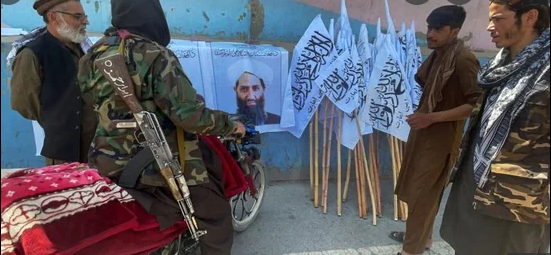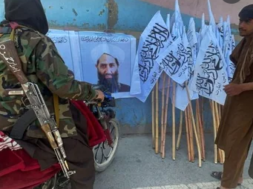
Roving Periscope: “Don’t call us terrorists,” TTP warns Pakistani media!
Virendra Pandit
New Delhi: An interim government is in place in Kabul. But it is only what it is: interim.
Afghanistan continues to be in flux with vested interests pulling it in different directions on a daily basis. Has peace really returned?
Now even the terrorists want to be called peaceniks!
Irked at a section of the Pakistani media relentlessly dubbing it as a terrorist outfit, the Islamabad-banned Tehreek-e-Taliban Pakistan (TTP) has warned journalists to refrain from calling it a “terrorist organization” and announced that it will step up its attacks inside Pakistan.
While the Pakistani Army and ISI-inspired sections of the media have been showering accolades on the Taliban as “Afghan nationalists”, it is condemning the TTP as a terror outfit.
The TTP, also known as the Pakistani Taliban, was created by 13 groups of armed Islamist militant ‘students’ under the leadership of Baitullah Mehsud in 2007. Basically a Pashtun tribal militant youths’ group, active along the Afghan-Pakistan borders, the TTP’s express objective is to overthrow the Pakistani nation-state, vanquish its army, and establish an Islamic Emirate like the Taliban’s in Afghanistan. In the past, the TTP launched several terror attacks inside Pakistan and killed many. It was banned in Pakistan in 2008.
Mehsud was killed in 2009 in a US drone attack but the TTP claimed he died of a kidney problem. The TTP regrouped a couple of years ago with nine more terror outfits merging into it.
The US-supported Afghanistan government had imprisoned nearly 2,500 TTP extremists who were released by the Taliban after it recaptured Kabul on August 15. With these detainees out of prisons, the TTP is now around 6,000-strong and, with the Taliban support, they are raring to wreak havoc in Pakistan, something Islamabad is trying to prevent by pulling strings in Kabul.
Both the Taliban and the TTP are, predominantly, populated by the Pashtun ethnic extremists. Even the 33-member interim government announced in Kabul on Monday has only three non-Pashtun members. Clearly, in the wheels-within-wheels state of affairs in the two countries, the Pashtuns have emerged as the single dominant ethnic group now ruling Afghanistan and eyeing Pakistan also.
This is what Pakistan dreads the most: an alliance of cross-border Pashtun terrorists whose oldest demand for a ‘Greater Pashtunistan’ has remained unfulfilled because of Islamabad’s divide-and-rule policy.
The Taliban has refused to pull Pakistan’s chestnuts out of the fire and asked it to deal with the TTP on its own, while also supporting its co-brother. Apart from its Pashtun affinity, the Taliban also support the TTP lest it aligns with the rival Islamic State-Khurasan (IS-K) and creates problems in Afghanistan.
The TTP was among the first to congratulate the Taliban’s capture of Afghanistan, and vowing to continue efforts for the imposition of Islamic law and a Muslim state in Pakistan. For the record, the Taliban have assured Pakistan that they will not allow their soil to be used by any terror element to spread instability or launch terror attacks in any country, including Pakistan. But it told Islamabad that it could also “negotiate” with the TTP the way the Taliban negotiated with the US!
Pakistan’s attempts to divide the Pashtun outfits on the plank of nationalism have irritated the TTP to no end.
On Monday, TTP spokesman Mohammad Khurasani said on social media that his organization was tracking Pakistani media coverage which branded the TTP with epithets such as “terrorists and extremists”.
“Using such terms for TTP showed a partisan role of media and journalists,” the Dawn newspaper quoted the online statement issued by the TTP.
“Such labels on the TTP meant the media professionals were dishonest towards their duty and would create enemies for itself,” Khurasani said, adding the media should call them by the name of Tehreek-i-Taliban Pakistan.
In its 2014 National Action Plan, Islamabad had banned offshoot groups of the TTP and stopped the media from its so-called “glorification of militants”.
At least 30 Pakistani journalists in the erstwhile FATA and Khyber Pakhtunkhwa have been killed and kidnapped in the last 10 years, being sandwiched between the militants and the government’s war on terror.
Despite claims in the Pakistan-inspired media, the fact is that the Taliban is regrouping the Pashtun extremists under its umbrella. Until it finds its feet, the Islamist militia is buying time by ‘accommodating’ diverse interests. Another fact is that it has only formed an interim, not regular, government. The picture will be clear once the whereabouts of the Taliban Supreme Leader Haibatullah Akhundzada, who is missing from the scene—he is speculated to be kept confined by Islamabad in a Pakistani prison for extracting concessions from the Taliban—become known.
The interim government is packed with this ethnic community. Interestingly, the new interim Prime Minister, Mullah Muhammad Hassan Akhund, an associate of the Taliban’s late founder Mullah Omar and Akhundzada, is seen as a rootless man, while Sirajuddin Haqqani, influential among the Pakistani Pashtuns, is the interior minister. The real power struggle will be when Akhundzada and Haqqani come to the same table.
Mullah Abdul Ghani Baradar, head of the movement’s political office, was named as Deputy PM. Reports said he was injured in a recent fracas with the Haqqani Network extremists. Some called it his “demotion” as he was, being the chief negotiator in the US-Taliban talks in Doha (Qatar), and political head of the group, was tipped to be the successor of former President Ashraf Ghani, who fled on August 15.
For now, the Taliban is waiting for Akhundzada…
More and more, Islamabad seems to be sinking in the Afghan quicksand.













